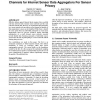Free Online Productivity Tools
i2Speak
i2Symbol
i2OCR
iTex2Img
iWeb2Print
iWeb2Shot
i2Type
iPdf2Split
iPdf2Merge
i2Bopomofo
i2Arabic
i2Style
i2Image
i2PDF
iLatex2Rtf
Sci2ools
IFIPTM
2009
2009
A Risk Based Approach to Limit the Effects of Covert Channels for Internet Sensor Data Aggregators for Sensor Privacy
Effective defense against Internet threats requires data on global real time network status. Internet sensor networks provide such real time network data. However, an organization that participates in a sensor network risks providing a covert channel to attackers if that organization's sensor can be identified. While there is benefit for every party when any individual participates in such sensor deployments, there are perverse incentives against individual participation. As a result, Internet sensor networks currently provide limited data. Ensuring anonymity of individual sensors can decrease the risk of participating in a sensor network without limiting data provision. Two contributions are made in this paper. The first is an anonymity mechanism to defeat injection attacks. This defense mechanism is based on economics rather than classic cryptographic protocols. The second builds on the foundations created by the first. It is the a proposal for randomized sampling of correlated...
| Added | 20 Feb 2011 |
| Updated | 20 Feb 2011 |
| Type | Journal |
| Year | 2009 |
| Where | IFIPTM |
| Authors | Camilo H. Viecco, L. Jean Camp |
Comments (0)

